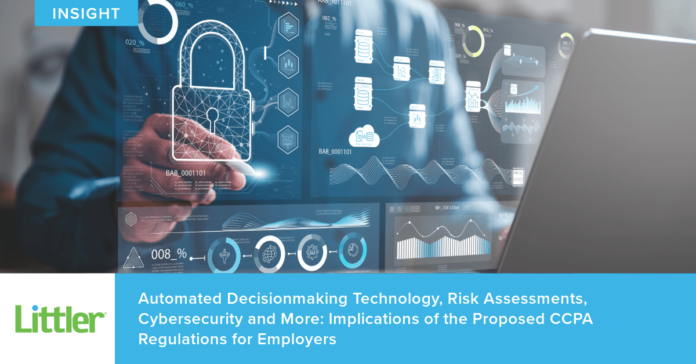California’s Proposed Regulations on Automated Decision-Making Technology: A New Era for Employers
On November 22, 2024, the California Privacy Protection Agency (CPPA) unveiled a set of proposed regulations that could significantly reshape the landscape of employment practices in the state. These regulations, which aim to implement the California Consumer Privacy Act (CCPA), focus on automated decision-making technology (ADMT), risk assessments, and cybersecurity audits. While the CCPA has primarily targeted consumer data protection, these new rules place a spotlight on employers, imposing substantial compliance burdens regarding their California applicants, employees, and independent contractors.
The Context of the Proposed Regulations
The CCPA was designed to provide comprehensive protections for the personal information of California residents, applying to most businesses operating in the state. The CPPA, established under the CCPA, has the authority to issue regulations on various topics, including those relevant to employment. The proposed regulations represent a significant expansion of the CCPA’s reach, particularly in the employment sector, where the use of technology in decision-making processes has become increasingly prevalent.
Key Components of the Proposed Regulations
The proposed regulations introduce three major areas of focus: risk assessments, cybersecurity audits, and the regulation of ADMT. Among these, the rules governing ADMT and risk assessments are expected to impose the heaviest burdens on employers.
-
Automated Decision-Making Technology (ADMT) Regulations
The regulations define ADMT broadly as any technology that processes personal information to execute decisions, replace human decision-making, or significantly facilitate human decision-making. Employers utilizing ADMT for significant employment decisions—such as hiring, compensation, and performance evaluations—will be required to adhere to several stipulations:- Pre-Use Notice: Employers must provide a detailed notice to California residents before using ADMT, outlining its purpose, functionality, and the rights of individuals to opt out.
- Privacy Policy Updates: Employers will need to revise their privacy policies to include information about their use of ADMT and the rights of individuals regarding this technology.
- Right to Opt Out: California residents will have the right to opt out of most uses of ADMT, which could complicate the streamlined processes that employers seek to achieve through automation.
-
Risk Assessments
The proposed regulations mandate that employers conduct detailed risk assessments for certain uses of HR data, particularly those involving ADMT. These assessments must evaluate approximately 30 elements to determine whether the risks to consumer privacy outweigh the benefits of processing personal information. Employers will need to submit these assessments to the CPPA, exposing their internal processes to regulatory scrutiny. - Cybersecurity Audits
While the cybersecurity audit requirements primarily target larger data processors, all employers should take note of the standards set forth. The audits must be conducted by independent auditors and cover various components, including data encryption and cybersecurity training. These audits will also require reporting to senior leadership, ensuring that data security remains a top priority.
Implications for Employers
The proposed regulations present a complex landscape for employers in California. The requirement to provide pre-use notices and updates to privacy policies will necessitate significant administrative effort. Furthermore, the right to opt out could undermine the efficiency gains that ADMT is designed to provide, as employers may need to create exceptions for each opt-out request.
The risk assessment obligations could also pose a challenge, as they require thorough documentation and submission to the CPPA. This level of scrutiny may deter some employers from utilizing ADMT altogether, potentially stifling innovation in hiring and employee management practices.
The Path Forward
The comment period for the proposed regulations will close on January 14, 2025, allowing stakeholders to voice their concerns and suggestions. The CPPA has until November 22, 2025, to submit the regulations for approval, marking a critical timeline for employers to prepare for potential changes.
As California continues to lead the way in privacy legislation, employers must stay informed and proactive in adapting to these new regulations. The implications of these rules extend beyond compliance; they represent a fundamental shift in how businesses approach data privacy and automated decision-making in the workplace. By understanding the requirements and preparing accordingly, employers can navigate this evolving landscape while safeguarding the rights of their employees and applicants.

